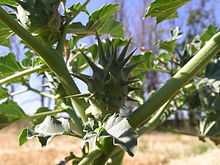Datura ferox
| Datura ferox | |
|---|---|
 | |
| Scientific classification | |
| Kingdom: | Plantae |
| (unranked): | Angiosperms |
| (unranked): | Eudicots |
| (unranked): | Asterids |
| Order: | Solanales |
| Family: | Solanaceae |
| Genus: | Datura |
| Species: | D. ferox |
| Binomial name | |
| Datura ferox L. | |
Datura ferox, commonly known as Long Spined Thorn Apple or Fierce Thornapple, is a species of Datura. Like all such species, every part of the plant contains deadly toxins that can kill animals (including humans) that ingest it. Its fruit, red-brown when ripe, has unusually long thorns or spikes.
The species was first described in 1756 by Linnaeus. Ferox means "strongly fortified," referring to the fearsome-looking spines on the seed pod. It probably originated in southeastern China. Today it is found in all the warm parts of the earth, where it is regarded as a dangerous pasture weed.[1]
Datura ferox is an upright shrub 1½ to 3 feet high. Its thick stalks often have a red-violet color at the base. All the young shoots are noticeably hairy. The most conspicuous part of the plant is its very wide undulate, irregularly-toothed leaves, which are covered with soft, downy hairs. The yellowish white flowers are funnel-shaped and inconspicuous, and usually do not open completely.[1]
Toxicity
All parts of Datura plants contain dangerous levels of tropane alkaloids (highly poisonous) and may be fatal if ingested by humans or other animals, including livestock and pets. In some places it is prohibited to buy, sell or cultivate Datura plants.[1]
See also
References
- ↑ 1.0 1.1 1.2 Preissel, Ulrike; Hans-Georg Preissel (2002). Brugmansia and Datura: Angel's Trumpets and Thorn Apples. Buffalo, New York: Firefly Books. p. 117. ISBN 1-55209-598-3.
External links
- Jepson Manual Treatment
- Photos of Datura ferox
- USDA Germplasm Resources Information Network (GRIN): Datura ferox L.
- Additional information about Datura ferox
| |||||||||||||||||